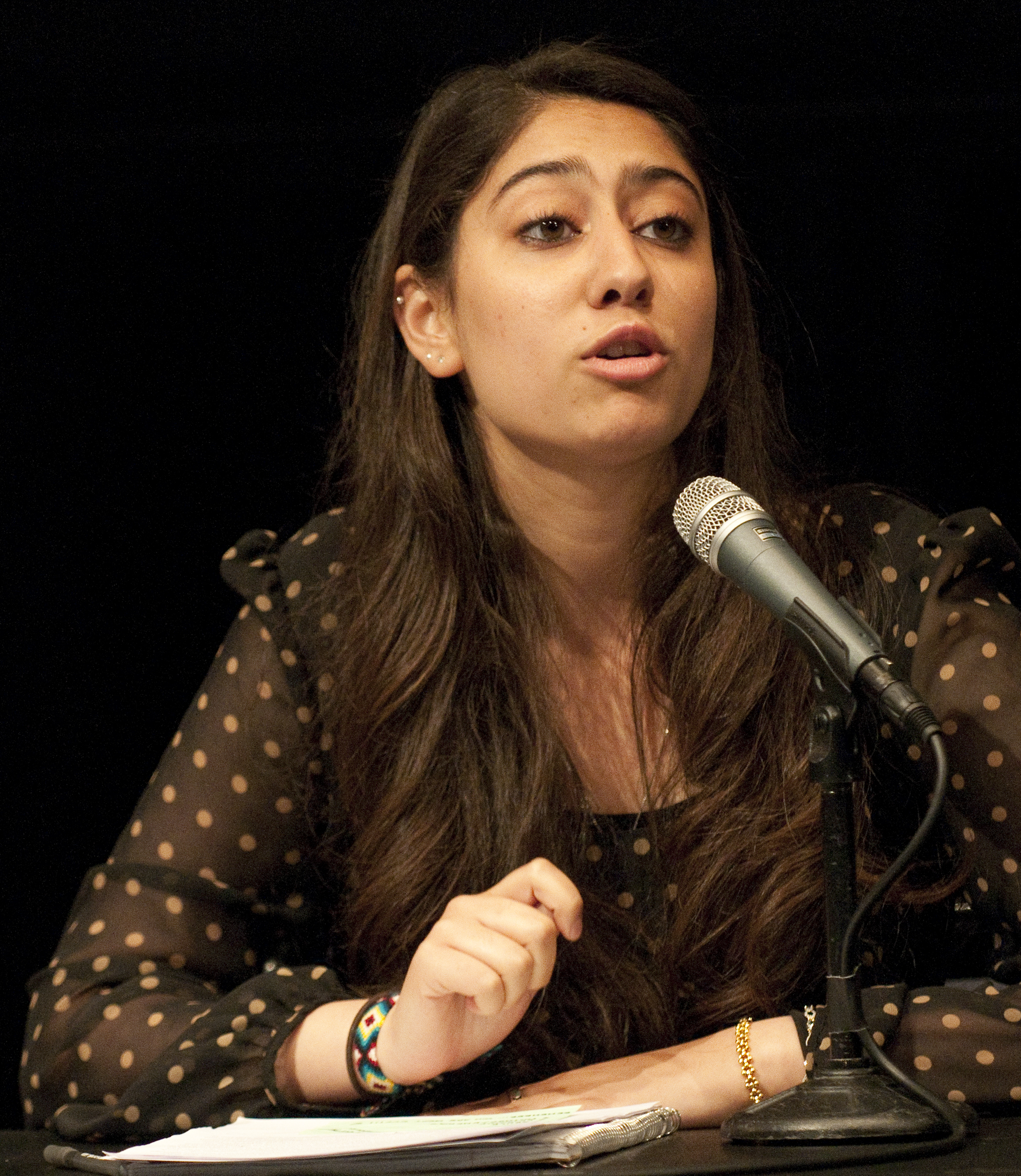
External vice president candidate Raquel Saxe speaks at the USAC election debate Saturday night.
A sea of snapping fingers, cheers and standing ovations erupted in the Northwest Campus Auditorium, as nearly 330 students gathered on the Hill on Saturday night to hear candidates for the upcoming student government elections debate their platforms.
With only three of the 13 offices in the Undergraduate Students Association Council up for contention, much of the attention at the debate focused around the three contested positions ““ external vice president, Financial Supports commissioner and Cultural Affairs commissioner.
Bruins United, one of the dominant slates on the council in recent years, has 10 candidates running for office in this year’s election, leading to a largely uncontested ballot.
A slate is a group of students that pools their resources together and runs under similar platforms.
The debate also included time slots for the discussion of two other motions on the ballot ““ a vote for a student fee increase of $9 per year, and a constitutional amendment to USAC bylaws that would change the name of the Student Welfare Commission to the Student Wellness Commission.
The event was moderated by Eena Singh, chair of the USAC election board and a third-year anthropology student.
Halfway through the event, Sahil Seth of Bruins United and independent candidate Taylor Bazley were the first candidates for a contested office to debate.
Both Financial Supports commissioner candidates said they plan to teach students about budgeting and finance, but disagreed about seeking corporate sponsorships for events. Seth said he planned to seek corporate sponsorships, while Bazley said he thought sponsorships were unrealistic and wanted to focus on cutting costs instead.
Seth also emphasized his experience as the chief of staff for general representative David Bocarsly’s office, while Bazley said that his outside perspective on USAC would help him analyze programs critically and impartially.
During the Cultural Affairs commissioner candidate debate, Allyson Taylor of Bruins United and independent candidate Taylor Mason discussed and debated topics such as recent hate crimes, campus climate, National Coming Out Week and the issue of artistic freedom for acts coming to UCLA.
Taylor said she was offended by language used by artists during shows at UCLA in recent years, which Mason said she was also concerned about, but said she ultimately supports artistic freedom.
In the third debate of the night for a contested position in the election, the two candidates for external vice president, current Academic Affairs Commissioner Raquel Saxe of Bruins United and independent candidate Lana Habib El-Farra, discussed how they would register voters, lobby on controversial issues, and decrease political apathy among students.
Both Saxe and El-Farra said they would try to represent all voices of the student body. Saxe stressed her relationships with the UCLA administration, while El-Farra emphasized her in-house candidacy and her plans to take stances on controversial issues.
After Saxe and El-Farra left the panel, more than half of the auditorium emptied out, with a student fee referendum, a proposed constitutional amendment and the presidential candidate still left for discussion in the debate.
Current councilmembers Jamie Yao and Tamir Sholklapper spoke in support of the Contingency USA/BOD Referendum Enactment, which places a vote for a $9 yearly student fee increase.
They cited inflation, a growing number of student groups asking for funding from USAC, and the negative impact of an increasing reliance on surplus funds, which fluctuate from year to year, by the council as reasons for students to vote for the CURE referendum. The referendum would use the student fee increase to fund student group programming.
There were no representatives who spoke against the referendum at the debate.
A lack of contention surrounding the measure itself is problematic, said Reza Hessabi, a fourth-year neuroscience student who watched the debate.
“It’s the same thing as having no one to run against David Bocarsly or all of the ten uncontested positions,” said Hessabi. “The fact that there aren’t two sides to the issue hurts the voters.”
Sholklapper also argued in favor of the proposed amendment that would change the name of the Student Welfare Commission to the Student Wellness Commission.
He said renaming the commission would more accurately describe the commission’s activities, which include events like Stress Free Days that aim to support student health.
Bocarsly, who is running uncontested for president as a Bruins United candidate, was the last person to speak at the debate.
He said he plans to look for alternative sources of funding other than student fees, support the Homecoming tradition that was reinstated by this year’s president Emily Resnick, and dedicate four hours a week to meeting with leaders of student groups to increase the outreach of his office into the UCLA student population.
